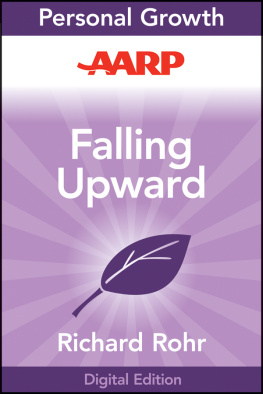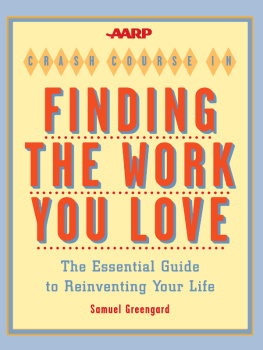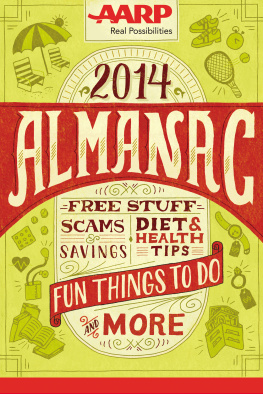One Nation under AARP
One Nation under AARP
The Fight over Medicare, Social Security,
and Americas Future
Frederick R. Lynch

University of California Press, one of the most distinguished university presses in the United States, enriches lives around the world by advancing scholarship in the humanities, social sciences, and natural sciences. Its activities are supported by the UC Press Foundation and by philanthropic contributions from individuals and institutions. For more information, visit www.ucpress.edu .
University of California Press
Berkeley and Los Angeles, California
University of California Press, Ltd.
London, England
2011 by Frederick R. Lynch
Library of Congress Cataloging-in-Publication Data
Lynch, Frederick R.
One nation under AARP : the fight over medicare, social security, and Americas future / Frederick R. Lynch.
p. cm.
Includes bibliographical references and index.
ISBN 978-0-520-25653-8 (cloth : alk. paper)
ISBN 978-0-520-26828-9 (pbk. : alk. paper)
1. Senior powerUnited States. 2. Older peoplePolitical activityUnited States. 3. Baby boom generationUnited States. 4. American Association of Retired Persons. I. Title.
HQ1064.U5L94 2011
306.380973dc22 2010037306
Manufactured in the United States of America
19 18 17 16 15 14 13 12 11
10 9 8 7 6 5 4 3 2 1
This book is printed on Cascades Enviro 100, a 100% post consumer waste, recycled, de-inked fiber. FSC recycled certified and processed chlorine free. It is acid free, Ecologo certified, and manufactured by BioGas energy.
Once again:
For my sister, Peg
And the memory of our parents
CONTENTS
ACKNOWLEDGMENTS
Many thanks to stalwart friends and colleagues Gary Jason, Jack Pitney, Jan Allard, Monica Morris, David Sadava, Bill Frey, Ralph Rossum, Joe Cardoza, Jonathan Tilove, and a very special colleague and pal, the late Judith Merkle. I very much appreciate Greg ONeill, H. R. Rick Moody, Bob Binstock, and Rob Hudson welcoming me into the ranks of gerontologists. John Rother and many others at AARP were extremely generous with time and insights.
My editor at UC Press, Naomi Schneider, was wonderfully supportive in reading numerous chapter drafts and, above all, extremely patient in providing generous deadline extensions to incorporate the unpredictable, unfolding developments of 2008 and 2010 that have proved so crucial in the saga of aging boomers, AARP, and the coming entitlement battles. Elisabeth Magnus was a tireless, sharp-eyed copy editor. My literary agent, Jill Marsal, facilitated my getting together with UC Press. Ive also been aided by able student assistants, Matt Horwitz, Alison Strother, and Reed MacPhail.
I am grateful for several grants sustaining the research over the years. More than a decade ago, the Sarah Scaife Foundation provided valuable seed money for this research, as did the Earhart Foundation. More recently, I was aided by several smaller grants from Claremont McKenna College research institutes, including the Benjamin Z. Gould Center, the Berger Institute for the Study of Work, Family, and Children, and the Office of the Dean of Faculty.
Former Claremont McKenna College president Jack Stark, current president Pamela B. Gann, deans Anthony Fucaloro, Jerry Garris, and Gregory Hess, and Government Department chair Ralph Rossum provided academic sanctuary for a politically incorrect sociologist. And a special salute to Jonathan Knight, former director of the American Association of University Professors Office of Academic Freedom, Tenure and Governancewhose legal acumen and blunt e-mails helped ensure that sanctuary finally became tenure.

Portions of appeared in abbreviated form in Political Power and the Baby Boomers in editor Robert Hudsons The New Politics of Old Age Policy, 2nd ed., The Johns Hopkins University Press. Expanded and updated reprinting with permission of The Johns Hopkins University Press.
Quotation of the television interview of Bill Clinton by Charlie Rose is by permission of The Charlie Rose Show.
Quotation of David Walker and a listener on the Diane Rehm Show is by permission of National Public Radios The Diane Rehm Show from WAMU-FM in Washington, D.C.
Introduction
Not Going Quietly
It wasnt like, Heres the political thing, heres the cultural thing. It was all woven together in the same sort of rebellious rock and roll attitude. When you said rock and roll, you didnt mean just the music. You meant it as a way of life, as a coat of armor against everything that was coming at you. It was a force to be reckoned with.
Michael Moore (2007)
We honored our part of the bargain. We are counting on the amounts reported to us on our Social Security forms. If this contract is broken, there will be hell to pay from a generation that knows how to organize and inflict political pain.
Letter to the editor, Washington Post (August 20, 2002)
On an October Friday night in 2006, the rock band Splash!whose members were in their twenties and thirtiesloudly belted out hits of the 1960s and 1970s. Most of the four hundred or so people listening and dancing to the music were in their fifties and early sixtiesaging baby boomers who did not necessarily think of themselves or their music as golden oldies. Yet this musical happening at Californias Anaheim Convention Center was hosted by AARP, part of a three-day Life @ 50+ megaconference that drew twenty-five thousand registered attendees.
The Anaheim megaconference would be one of the smoothest, most successfuland certainly the most star-studdedof these annual events, which had begun with a mere six thousand attendees at the first Life @ 50+ gathering in Dallas in 2001. And, befitting the Disneyland slogan of the happiest place on earth, the 2006 event may have been the most upbeat and carefree of all such gatherings before and since. Under the blue skies and golden California sun, the 20002002 Dot-Com Crash had become a dim memory, while the gathering thunderclouds of the coming real estate meltdown, stock market crash, and Great Recession were still not yet on the horizon.
A primary purpose of these entertainment-and-merchandizing extravaganzas is to demonstrate to fifty-plus boomers that the nations largest senior citizen lobby is no longer their parents AARP. A rebranded forty-million-member AARP is actively recruiting seventy-eight million graying baby boomers (born 194664). The mating dance of these organizational and generational giants has enormous implications for the nations political future. Just under half the voters in the 2008 and 2010 elections were over age fifty; approximately half of those voters were also members of AARP, the nations fourth-highest-spending lobbying organization from 1998 to 2009. Not since the heyday of Americas industrial unions has there been such a potential concentration of member-based organizational clout. And this development remains completely unstudied.
The relatively few books about boomers chronicle their contentious past. This one is about their even more problematic economic, political, and sociological future. Boomers will not go gently into that good night. As young adults, an educated boomer vanguard wrought considerable political and social change. Forty years later, boomers are again politically restive. Historic real estate and stock market declines have made large numbers of them economically vulnerable just as they approach voluntary (or forced) retirement and old age. As a group, aging boomers are not financially prepared for retirement and old age; they are going to be more dependent upon Medicare and Social Security than theyd ever assumed. They are also politically and culturally vulnerable; they are not well liked; as a generation they are often self-critical and apologetic: stereotypes abound.
Next page











